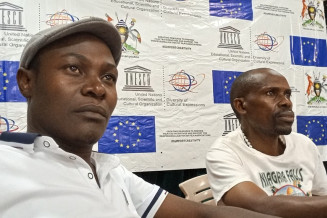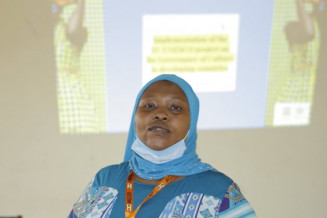Before the city of Kampala wakes up, Mzee Bwanika Julius prepares his first coffee. The clock has just hit four in the morning and Mzee looks forward to the three hours ahead of him before starting his work in the office. In the silence of the early morning, he resumes writing his last script, which he has been working on for the last few weeks. His passion for cinema as a Ugandan director and producer has led him to combine his creative career with cultural management within the film industry.
At eight in the morning, Mzee is already in the office of Pearlwood, the umbrella organization of all entities of the Ugandan film industry, of which he serves as Executive Secretary.
With nearly 20 years of film production experience, Mzee has spent his entire career in the film industry as an actor, screenwriter, producer, and filmmaker and has worked on more than fifteen films. During his career, he has closely witnessed the rise of cinema in Uganda in the 2000s, spurred by the penetration of digital technologies, the consolidation of local television, and a diminishing public support for theater.
This boom, however, has not been accompanied by a regulation of the sector. On the contrary, for many years regulation functions were scattered among state agencies that were poorly coordinated with each other. As a consequence, among others, the industry experienced a great imbalance to the detriment of filmmakers who often saw their work underpaid despite being well received by local audiences. Likewise, film professionals used to find it difficult to access filming locations and were forced to pay numerous taxes that increased the production costs.
To change this situation, the Ugandan Ministry of Gender, Labor and Social Development, in partnership with UNESCO and the European Union, launched the project "Creation of tax incentives to support local development and professionalization of the film sector in Uganda". This project addresses the problem of the high costs of film production through tax incentives for the sector.
The initiative is part of a vision of culture as an engine of economic development, established in Uganda’s Third National Development Plan 2020/21 - 2024/25. The project maps the gaps in cinematographic cultural policies; capacity building workshops have been held, and spaces for collaboration have been created between the State and non-governmental actors.

Molly Nakamya and Mzee share a passion for film and the belief that creating a supportive environment is key to the development of the industry. In 2020, Molly was nominated as the contact person for the Association of Film and Video Training Institutions and as such invited to the implementation of the first phase of the project.

Within this framework, Nakamya accompanied the consultations to identify the challenges of the emerging film sector in the country in the first phase of the project. Four regional workshops were held in which the main challenges outlined were the limited access to financing, the insufficient capacities and training, the inaccessibility of modern equipment and the limited market and film distribution networks. These findings subsequently made it possible to develop and apply strategic measures in the following phases of the project.
Nakamya enthusiastically summarizes how this project has contributed to improving the lives of members of the film community:
Nalubega Hajara works as a Senior Culture Officer at the Ministry of Culture. Passionate about improving the culture sector and the lives of its professionals, she dreamed of “seeing the film industry flourish with high-quality, competitive products within Uganda and around the world”. She participated in the launch of the project and in the orientation of the 23 representatives of the national team of the film industry, including members of civil society. She has also been involved in consultations with beneficiaries and government agencies as well as in capacity building activities and peer involvement.

The second phase of the project consisted of a capacity building peer exchange. To this end, Ugandan industry professionals held several working sessions with their South African and Kenyan peers. Within this framework, they developed benchmarking exercises in which good practices of film policies in South Africa and Kenya were evaluated.
Between March and April 2021, thirty professionals also strengthened their capacities for participatory policy formulation during a workshop in Kampala. Participants recommended various strategic measures to solve the identified challenges as well as action plans and evaluation criteria. These measures have been submitted as a draft to government agencies for review.
Nalubega then explains how many filmmakers have now returned to business:
As a result of the project, a category of cinema has been included in the country's Innovation Fund for 2021/2022. Above all, the Kibanda Xpress audiovisual platform was launched in April 2021, which will offer a catalog of Ugandan films with a subsidized subscription fee and no connection costs.

Mzee is very satisfied with what he has achieved through this project. As he claims, the initiative has built a bridge between film professionals and the Ministry. This has led to a more conscious and strategic work.
Evening falls in Kampala, and Mzee turns off his computer to go home and spend some time with his family. Along the way, he ruminates over some ideas how to continue his script the following morning, knowing with more certainty than ever that, once finished, it will reach the screens of the Ugandan public as a film.






